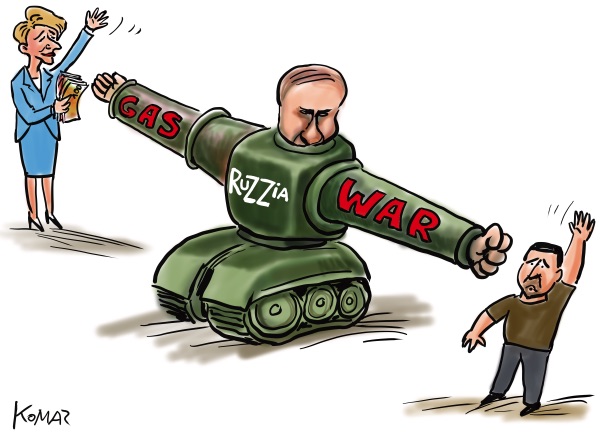Weapons and Politeness
Sanctions, and Who Will Actually Be Harmed or Benefit

You can do a lot more with weapons and politeness than just politeness.
Vladimir Putin
The U.S.A. has previously resorted to the use of polite sanctions against Russia, as it has in a lot of countries. It cut off Iranian oil flows, limited trade with North Korea, and froze bank accounts of Russian officials. The reality is that Russia is still well positioned to grab significant portions of Ukraine. Iran still has a nuclear program, and North Korea still has actual nuclear weapons. So long as Russia continues to trade with China, Mexico, Brazil, and India, U.S.A. sanctions have little impact.
Russia has endured sanctions for years dating back as far as the Crimea annexation in 2014 with no behavioral change. Allegedly, Putin’s response was, “We must thank the Europeans for their agricultural sanctions. Well done. Thank you for all your sanctions. Russia doesn’t give a shit about sanctions.”
Sanctions against Russia have a long and failed history. Instead of harming Putin, sanctions tend to hurt the Russian people. Imports make up one-fifth of Russia’s GDP. Sanctions of those goods and products imports are now starving Russians, as well as their economy, but the exceptions for oil and gas exports to Europe are a large part of what’s keeping the Russian economy very much alive.
Though we should continue to cut off all Russia revenue from oil and gas, the more effective target is Russia’s world prestige, such as excluding Russia from world sporting, competitive, and cultural events. This is what Russians care deeply about and would inflict severe harm to Putin’s popularity. More than anything else, Russians seek world recognition and respect. Russians deeply love their country. They may criticize it themselves, but if someone else were to do it, Russians will profoundly defend it.
There will likely be winners once a treaty ends Russia’s invasion of Ukraine, and of course, there will be losers. Russia, India, and Germany will incur the greatest losses and suffer in the years ahead, while China, U.S.A., and France will emerge as winners. Ukraine will undoubtedly rebuild and emerge geopolitically; however, it will not fare well in the longer term economically.
Russia will continue to be cut off from the global financial system, and the European Union will move away from Russian energy dependence. Russia doesn’t offer the world much in terms of goods beyond energy and weapons; thus, it will be drained economically in the coming years. Natural gas and oil exports are the mainstream life blood of the Russian economy, which in turn powers Russia’s military ambitions and its arsenal.
India cannot operate effectively without Russian-supplied equipment. India allocated $70.2 billion on military spending, mostly for Russian weapons. India continues to rely on Russia despite the U.S. threat of sanctions. Up until recently, India had consistently abstained at United Nations’ forums to criticize Russia’s aggressive stance against Ukraine. As allegations of atrocities in Ukraine mount, India now is supporting an independent inquiry into civilian killings in Bucha. A strengthening of the U.S./India relationship may be in the cards.
Germany will suffer the most economic pain as a result of their weaning off of Russian oil and gas. They will be the hardest hit with the combination of sluggish economic growth and high inflation given its dependency on Russia for its energy needs.
China, while not yet fully supportive of Russia, it nonetheless abstained in the United Nations vote condemning Russia’s invasion of Ukraine. U.S. sanctions have not exactly energized pro-American popularity in China, Russia, Cuba, Iran, North Korea, Venezuela, or any other state for that matter. China will only benefit if Russia withstands western economic sanctions, which thus far appears unlikely. China can, at any point cut off its Russian exports making Russia a larger version of North Korea.
U.S.A. will benefit as a result of the North Atlantic Treaty Organization’s (NATO) strengthening. The U.S. has long shouldered the bulk of funding NATO’s missile defense. The Western European nations will need to increase their funding participation as their honeymoon period of living off the U.S. is now over. Finland and Sweden may also join NATO, further strengthening its effectiveness. But the single biggest benefit for the U.S. is that we will now have the European Union better aligned in our conflict against Russia and China.
France does not rely on Russia for its oil and gas energy. Instead France has elected to pursue reliance on nuclear energy. Nor do they rely much on trade with China (less than 5 percent of their exports are to China) which is a major benefit in times of conflict. France is largely self-sufficient in key strategic aspects of food, energy, weapons, and advanced technology. Thus, Russia nor China have any significant leverage over France, allowing the French the enviable position of becoming Europe’s new power leader. France is also geographically comfortably displaced from Russia, so are able to leverage power with less concern of invasion.
I pray for the people of Ukraine and that of Russia’s civilians. My hope is that a rapid resolution to the conflict takes place, peace is reinstated, and that Vladimir Putin is removed from power.



